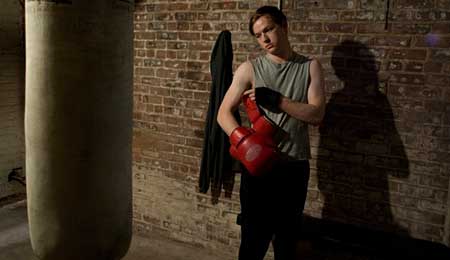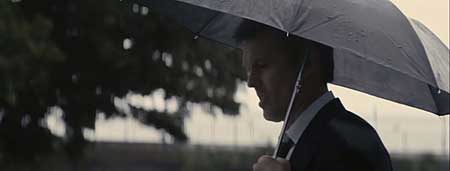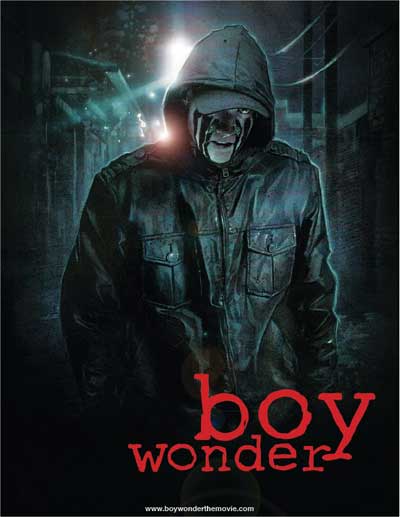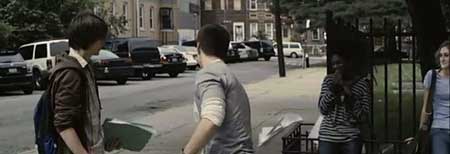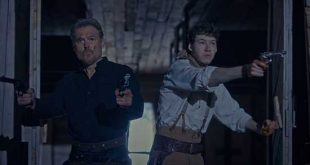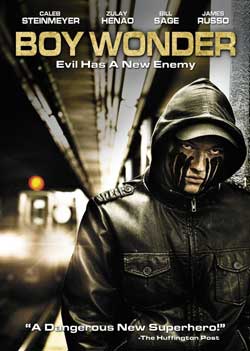 SYNOPSIS:
SYNOPSIS:
A young Brooklyn boy witnesses the brutal murder of his mother and grows up obsessed with finding her killer. Thus begins his life as a quiet, straight-A student by day and a self-appointed hero at night. But what is a real hero? And who decides what is right or wrong? As the boundaries blur, Sean’s dual life wears on his psyche and his two worlds careen dangerously close to colliding. Like a graphic novel you can’t put down, Boy Wonder challenges morality, distorting perceptions of what is right and what is justified, as it races to its shocking conclusion.
REVIEW:
“Boy Wonder” is the directorial debut of TV producer, Michael Morrissey. It stars Caleb Steinmeyer as the titular boy, who after witnessing his mother’s brutal murder, lives with his horror by becoming a vigilante on the Brooklyn streets at night. A psychological thriller, Morrissey’s film focuses on the meanings behind action, and the consequences of real decisions.
The film offers a false sense of security as soon as the first scene, until it rips the viewer from their safety by showing parts of the attack on Sean’s (Steinmeyer) mother throughout the first act. Slowly, but surely, the audience sees the effect these acts have had on Sean. His confusion, hatred, hurt, and dedication lead him to finding trouble on the streets, and taking care of it in his own way.
The first act of the film sets a good pace, atmosphere and tone. Morrissey firmly grounds his film in a gritty reality, sometimes too gritty. An awkward racial sensitivity confrontation happens between two cops, one white and one Latina, right off the bat. The dialogue is a little forced and awkward, but it is used to establish the brass of Teresa (Zulay Henao), a new cop who befriends the protagonist and helps the story to move forward.
The movie starkly changes when the criminal element is introduced at different points. It goes from a relatively straight-forward narrative structure, to a style inspired by “The Bourne Ultimatum” (2007). This can be distracting, but at the same time, establishes the change in Sean as he goes from a straight-A student during the day, to a violent vigilante at night. His confrontations tend to start with the right intentions. He wants to help, or save, innocent victims from the criminals that are harassing them, until these incidents spiral out of control to deadly conclusions.
As Sean continues his escapades on the streets, his relationship with his father is failing. The cops, specifically Teresa, are starting to get suspicious of a link between these seemingly unrelated crimes, and Sean’s mysterious behavior (but the police have yet to realize the full impact). Teresa and Sean begin to build a trusting relationship, as if both thinks they are a guardian for the other. This creates a conflict worth watching, and drives a tension through the story. These instances of dialogue, these points of conflict between the characters, show off powerful performances from the two leads, and really shine.
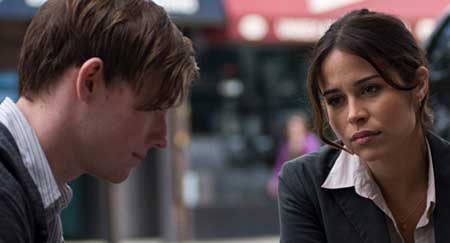 After a close encounter with the police, including Teresa, on a train, Sean is chased through the station. He was beating a homeless man, who was accosting passengers, and stopped just before he was caught. His vigilante decision-making starts to turn fuzzy. Is he the hero? Is he doing the right thing? Is he the bad guy? Will he be caught? Who is Sean, really? His world continues to start crashing down around him.
After a close encounter with the police, including Teresa, on a train, Sean is chased through the station. He was beating a homeless man, who was accosting passengers, and stopped just before he was caught. His vigilante decision-making starts to turn fuzzy. Is he the hero? Is he doing the right thing? Is he the bad guy? Will he be caught? Who is Sean, really? His world continues to start crashing down around him.
The film does a great job of keeping up its production value. Some low budget give-aways are present (color filters, dense lighting, shaky cam, fast blurry cuts), but great set pieces are used throughout. Police stations, street scenes, boxing matches, and train stations all help make this movie look stronger, and more expensive, than it was to begin with.
In the third act, Sean’s mind becomes a victim of his own pain. He struggles with right and wrong, and fights against becoming what he hates the most. His world is crashing as his mother’s death stays fresh in his mind. One memory can destroy a life, even if it takes years to do so.
“Boy Wonder” is an example of the classic hero mythology, told in a new way. Instead of the cliché comic book turn, Morrissey gives his audience a new look. Fans say “The Dark Knight” (2008) is gritty, but those fans most likely haven’t seen this piece. A small festival favorite, strong performances and a compelling story keep this film afloat. A surprise, to say the least. The new take on the classic legend is refreshing, enjoyable, and all together worthwhile. It does not fall to repetition, or stereotype. Often times psychological thrillers can try too hard, but this film does not. It delivers what it should, and stays strong throughout.
Boy Wonder (2010)
 Horror News | HNN Official Site | Horror Movies,Trailers, Reviews
Horror News | HNN Official Site | Horror Movies,Trailers, Reviews

